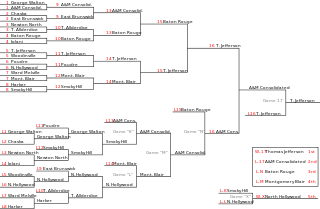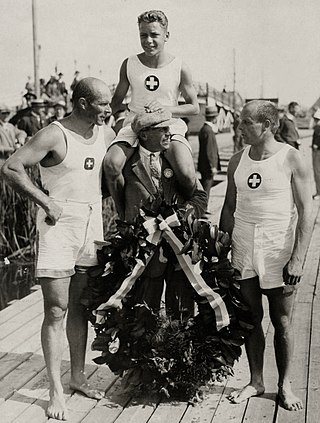Related Research Articles
Archery at the 1996 Summer Olympics in Atlanta consisted of four events. The events were held in neighboring Stone Mountain. All archery was done at a range of 70 metres. 64 archers competed in each the men's individual and women's individual competitions. They began with a 72-arrow ranking round. This was followed by three elimination rounds, in which archers competed head-to-head in 18-arrow matches. After these rounds, there were 8 archers left in each gender. The quarterfinals, semifinals, and medal matches were 12-arrow matches. In all matches, losers were eliminated and received a final rank determined by their score in that round, with the exception of the semifinals. The losers of the semifinals competed in the bronze medal match.

A double-elimination tournament is a type of elimination tournament competition in which a participant ceases to be eligible to win the tournament's championship upon having lost two games or matches. It stands in contrast to a single-elimination tournament, in which only one defeat results in elimination.

The men's 100 metres was a sprinting event on the athletics programme at the 1900 Summer Olympics in Paris. It was held on July 14, 1900. 20 athletes from nine nations competed. The event was won by Frank Jarvis of the United States, the second of three straight gold medals by different Americans in the event. Australia medaled in the event for the first time, a bronze by Stan Rowley.

The men's coxed four was one of the competitions in the Rowing at the 1900 Summer Olympics events in Paris. The competition was plagued by controversy involving which boats should advance to the final. In one of the most unusual decisions in Olympic history, two separate finals were held for the event, each of which is still considered an Olympic championship by the International Olympic Committee. The crews of all six boats to compete in the two finals are Olympic medallists.

Great Britain, represented by the British Olympic Association (BOA), competed as the host nation of the 1908 Summer Olympics in London. The British Olympic Association was the National Olympic Committee responsible for organising the United Kingdom's representation. At the time British athletes competed under the team name "United Kingdom". The British team comprised 676 competitors.
The men's K-2 1000 metres event was a pairs kayaking event conducted as part of the Canoeing at the 1964 Summer Olympics programme on Lake Sagami, Japan.
The men's K-4 1000 metres event was a fours kayaking event conducted as part of the Canoeing at the 1964 Summer Olympics programme on Lake Sagami, Japan. This event debuted at these games and is only one of two events that has been at every ICF Canoe Sprint World Championships.

The men's sprint was a track cycling event held as part of the Cycling at the 1964 Summer Olympics programme. It was held on 17 and 18 October 1964 at the Hachioji Velodrome. 39 cyclists from 22 nations competed. Nations were limited to two cyclists each. The event was won by Giovanni Pettenella of Italy, the nation's second consecutive and fourth overall victory in the men's sprint. Sergio Bianchetto took silver, making it the second consecutive Games in which Italy had two men on the podium in the event. It was also the fifth straight Games with Italy taking at least silver. Daniel Morelon of France took bronze, the first of his record four medals in the event.

The men's eight event was part of the rowing programme at the 1924 Summer Olympics. The competition, the sixth appearance of the event, was held from 13 to 17 July 1924 on the river Seine. Ten teams, each from a different nation, competed. The event was won by the United States, the nation's second consecutive and fourth overall victory in the event. Canada took silver, its first medal in the men's eight since 1908. Italy, making its debut in the event, took bronze.
John MacDonald is a New Zealand sprint canoeist who competed in the late 1980s and early 1990s. He was eliminated in the semifinals of the K-4 1000 m event at the 1988 Summer Olympics in Seoul. Four years later in Barcelona, he was eliminated in the semifinals of both the K-1 500 m and K-1 1000 m events.
Stephen Richards is a New Zealand sprint canoeist who competed in the late 1980s and early 1990s. He was eliminated in the semifinals of the K-4 1000 m event at the 1988 Summer Olympics in Seoul. Four years later in Barcelona, he was eliminated in the semifinals of the same event.

The men's coxed pair event was part of the rowing programme at the 1928 Summer Olympics. It was one of seven rowing events for men and was the fourth appearance of the event. It was held from 3 to 10 August near Sloten, Amsterdam. There were 6 boats from 6 nations, with each nation limited to one boat in the event. The event was won by the Swiss team, the nation's second consecutive victory in the event. Brothers Hans Schöchlin and Karl Schöchlin rowed, with Hans Bourquin the coxswain. Another pair of brothers took silver: France's Armand Marcelle and Édouard Marcelle. The Belgian bronze medal team consisted of Léon Flament, François de Coninck, and Georges Anthony; it was the nation's first medal in the event.

The men's coxed four event was part of the rowing programme at the 1928 Summer Olympics. It was one of seven rowing events for men and was the fifth appearance of the event. It was held from 3 to 10 August. There were 11 boats from 11 nations, with each nation limited to a single boat in the event. The event was won by Italy, the nation's first medal in the men's coxed four. The Italian team dethroned two-time reigning champion Switzerland, beating the Swiss crew in both the semifinals and the final. Switzerland's silver medal brought its podium streak in the event to three Games; the United States had its two-Games medal streak end. Poland took bronze, its first medal in the event.

The men's eight event was part of the rowing programme at the 1928 Summer Olympics. It was one of seven rowing events for men and was the seventh appearance of the event, which had been on the programme for every Olympic Games since rowing was added in 1900. It was held from 2 to 10 August 1928. There were 11 boats from 11 nations, with each nation limited to a single boat in the event. The event was won by the United States, the third consecutive victory for the Americans in the event and fifth overall. Great Britain returned to the podium after a one-Games absence in 1924 broke a three-Games medal streak, taking silver this time. Defending silver medalists Canada took bronze.

The men's eight competition at the 1972 Summer Olympics in Munich took place from 27 August to 2 September at the Olympic Reggatta Course in Oberschleißheim. There were 15 boats from 15 nations, with each nation limited to a single boat in the event. The event was won by New Zealand, the nation's first medal in the men's eight. Silver went to the United States. East Germany also earned its first medal in the event, with bronze.

The men's team pursuit at the 1960 Summer Olympics in Rome, Italy was held from 27 to 29 August 1960. There were 76 participants from 19 nations.

The men's eight competition at the 1948 Summer Olympics took place at Henley-on-Thames, near London. It was held from 5 to 9 August. There were 12 boats from 12 nations, with each nation limited to a single boat in the event. The event was won by the United States, the nation's sixth consecutive and eighth overall gold medal in the men's eight; the Americans had won every time they competed. Great Britain, the only other nation to have won in the event, finished second for its first medal in the event since 1928. Norway took bronze, its first medal in the men's eight since 1920.

The men's eight competition at the 1956 Summer Olympics took place at Lake Wendouree near Ballarat, Australia. It was held from 23 to 27 November. There were 10 boats from 10 nations, with each nation limited to a single boat in the event. The event was won by the United States, the nation's eighth consecutive and 10th overall gold medal in the men's eight; the Americans had won every time they competed. Canada took silver, its first medal in the men's eight since 1932. Australia repeated as bronze medalists.

The men's coxed four competition at the 1960 Summer Olympics took place at Lake Albano, Italy. It was held from 31 August to 3 September. There were 21 boats from 21 nations, with each nation limited to a single boat in the competition. The event was won by the United Team of Germany in its debut in the event. Silver went to the French crew, the nation's first medal in the event since 1936. The defending champions Italy received bronze this time. In an event which saw constant turnover even from consistently strong nations, three members of the Italian team returned from the 1956 gold-medal crew to earn a second medal this Games: Romano Sgheiz, Ivo Stefanoni, and Franco Trincavelli were only the 2nd, 3rd, and 4th men to earn multiple medals in the coxed four.
The men's coxless four competition at the 1996 Summer Olympics in Atlanta, Georgia took place at Lake Lanier.